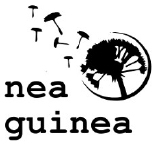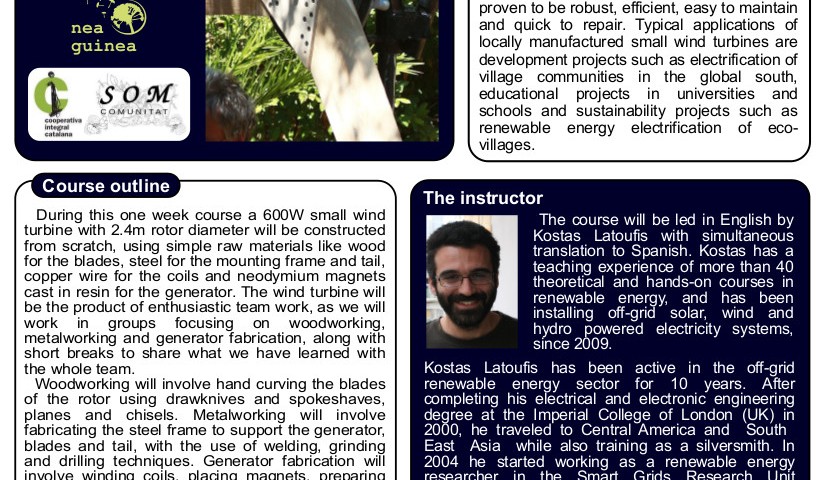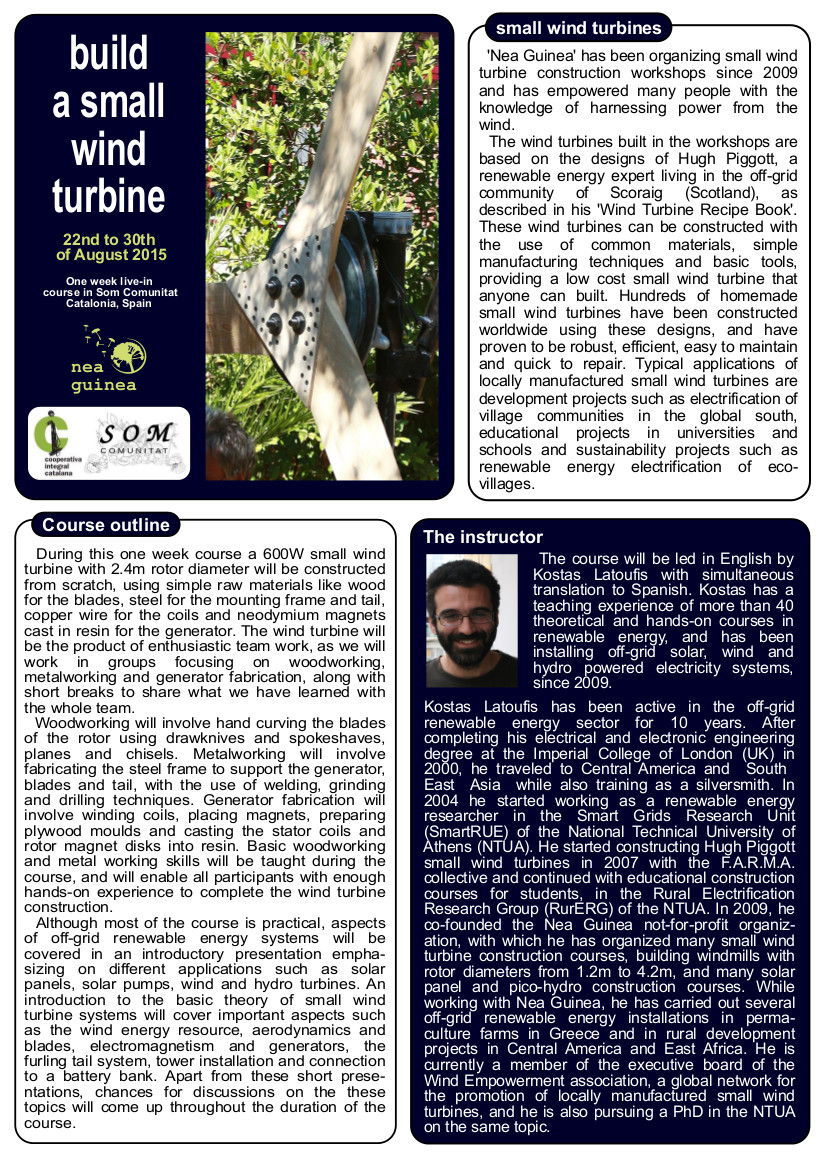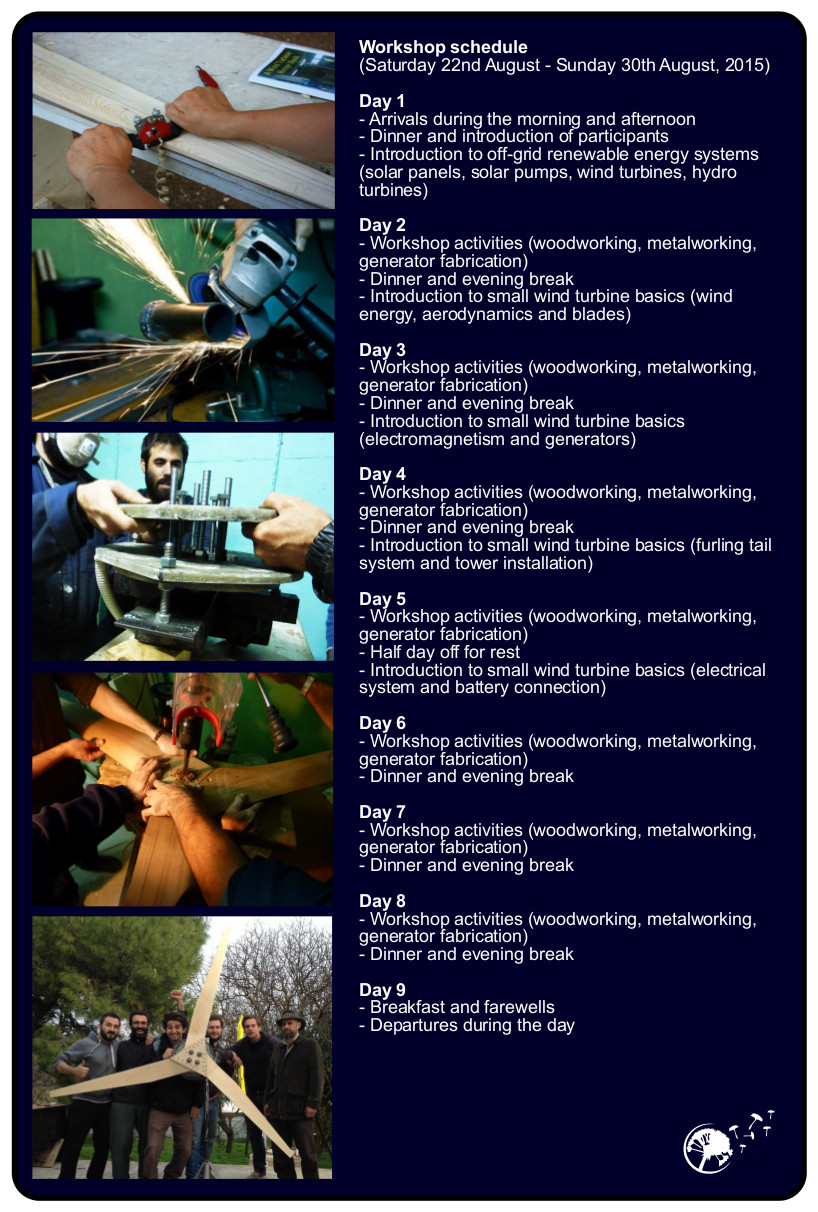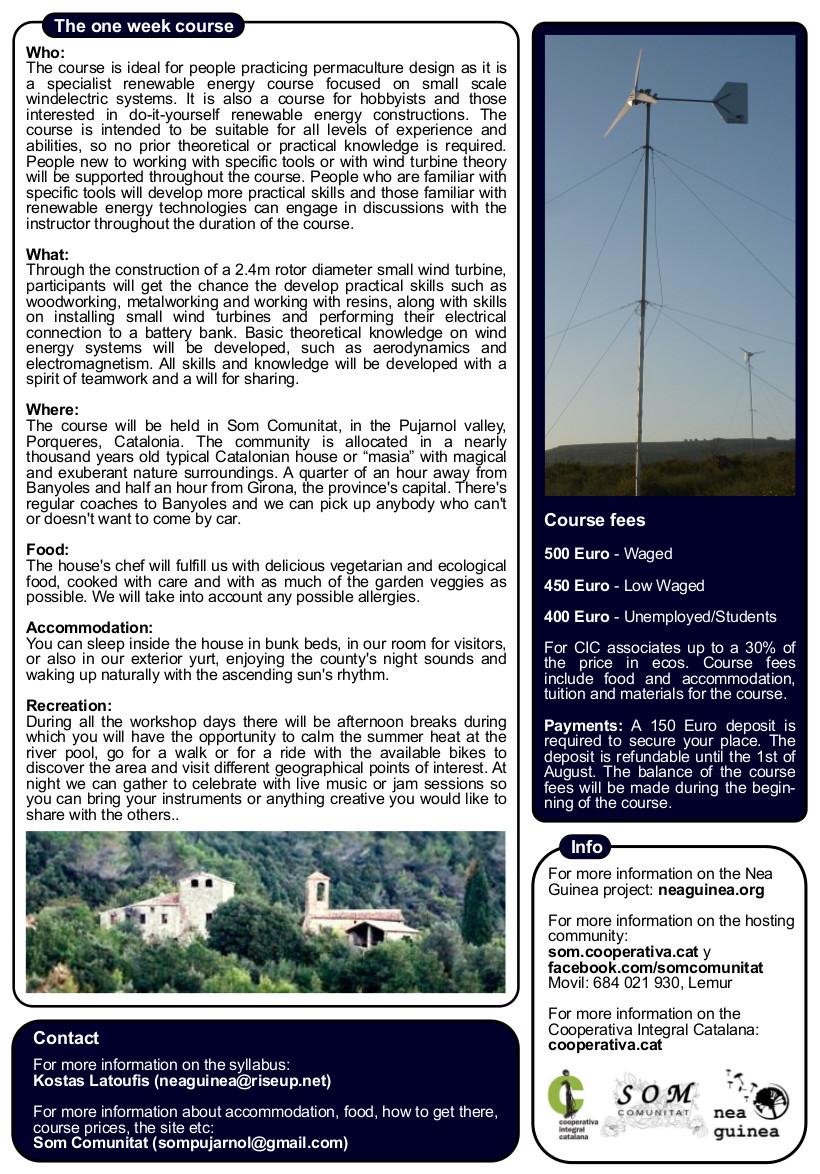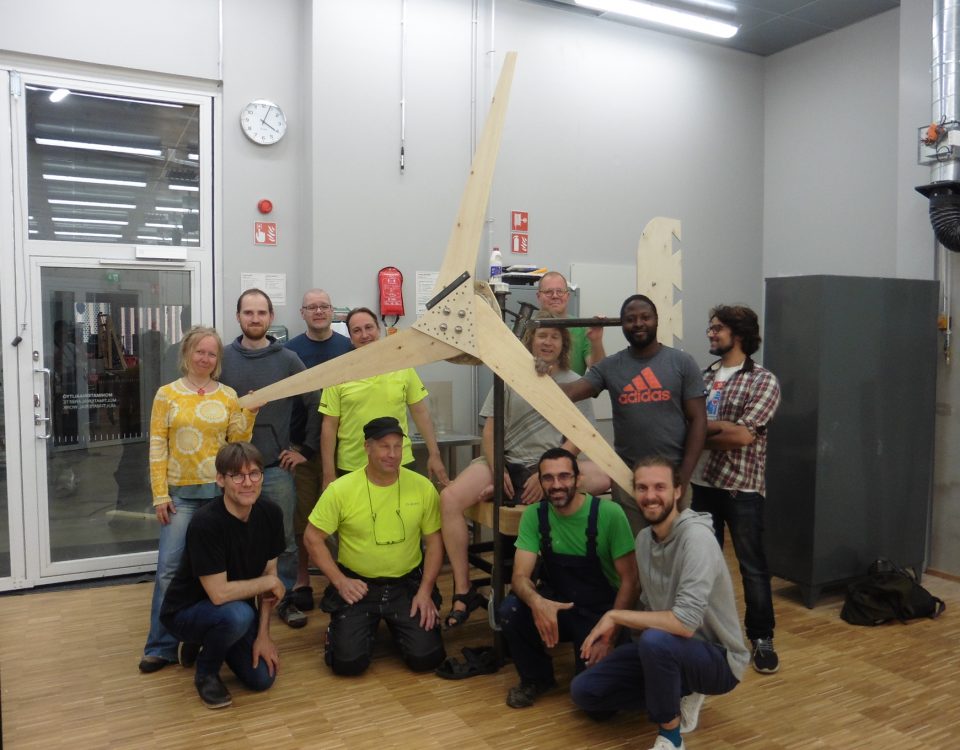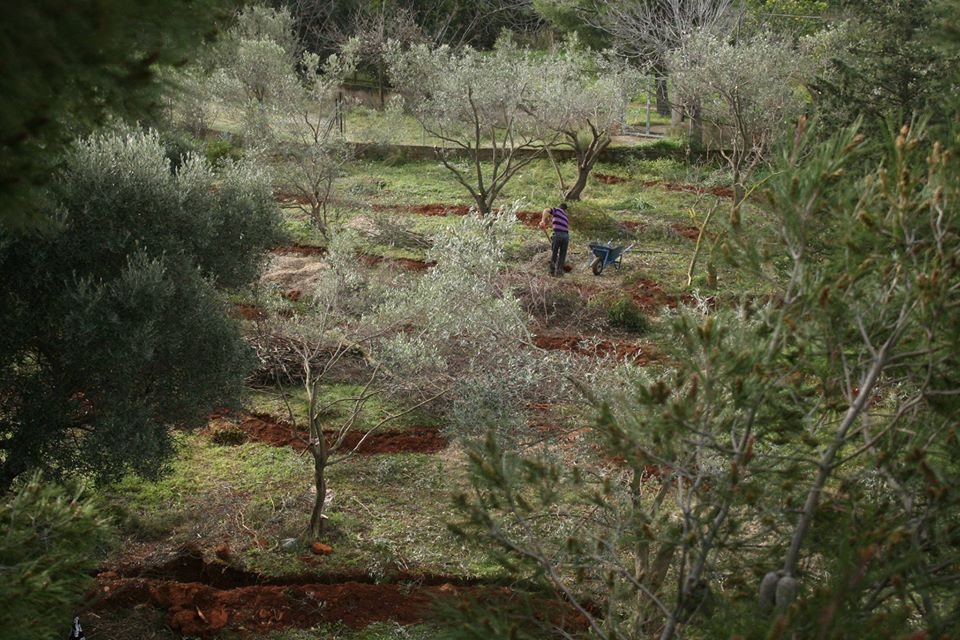
24th July – 2nd August: “Build a small wind turbine” construction course in Nea Makri, Greece
18 April 2015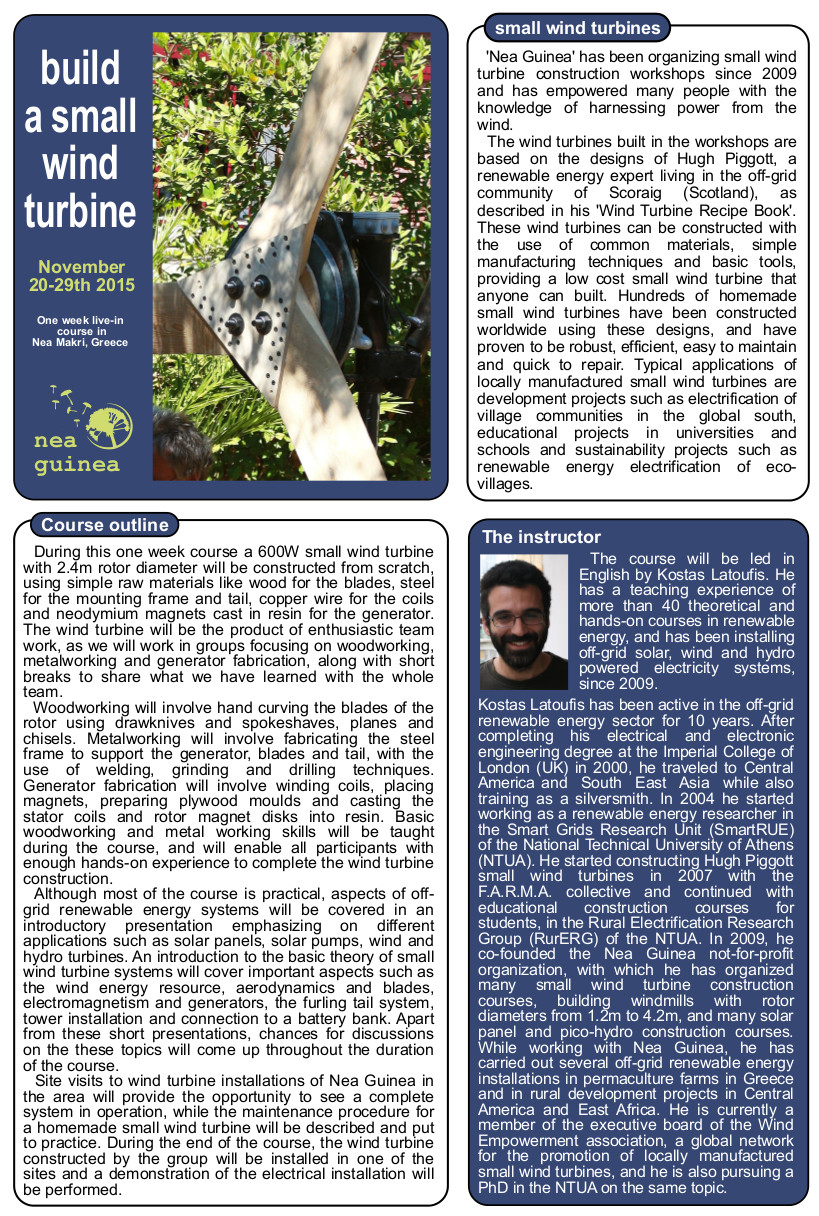
20-29th November: “Build a small wind turbine” construction course in Nea Makri, Greece
19 August 201522nd – 30th August: “Build a small wind turbine” construction course in Porqueres, Catalonia
“Build a small wind turbine” construction course in Porqueres, Catalonia
22nd to 30th of August 2015
One week live-in course in Som Comunitat Catalonia, Spain
Organized by Nea Guinea, Som Comunitat and the Catalan Integral Cooperative
Small wind turbines
‘Nea Guinea’ has been organizing small wind turbine construction workshops since 2009 and has empowered many people with the knowledge of harnessing power from the wind.
The wind turbines built in the workshops are based on the designs of Hugh Piggott, a renewable energy expert living in the off-grid community of Scoraig (Scotland), as described in his ‘Wind Turbine Recipe Book’. These wind turbines can be constructed with the use of common materials, simple manufacturing techniques and basic tools, providing a low cost small wind turbine that anyone can built. Hundreds of homemade small wind turbines have been constructed worldwide using these designs, and have proven to be robust, efficient, easy to maintain and quick to repair. Typical applications of locally manufactured small wind turbines are development projects such as electrification of village communities in the global south, educational projects in universities and schools and sustainability projects such as renewable energy electrification of eco-villages.
Course outline
During this one week course a 600W small wind turbine with 2.4m rotor diameter will be constructed from scratch, using simple raw materials like wood for the blades, steel for the mounting frame and tail, copper wire for the coils and neodymium magnets cast in resin for the generator. The wind turbine will be the product of enthusiastic team work, as we will work in groups focusing on woodworking, metalworking and generator fabrication, along with short breaks to share what we have learned with the whole team.
Woodworking will involve hand curving the blades of the rotor using drawknives and spokeshaves, planes and chisels. Metalworking will involve fabricating the steel frame to support the generator, blades and tail, with the use of welding, grinding and drilling techniques. Generator fabrication will involve winding coils, placing magnets, preparing plywood moulds and casting the stator coils and rotor magnet disks into resin. Basic woodworking and metal working skills will be taught during the course, and will enable all participants with enough hands-on experience to complete the wind turbine construction.
Although most of the course is practical, aspects of off-grid renewable energy systems will be covered in an introductory presentation emphasizing on different applications such as solar panels, solar pumps, wind and hydro turbines. An introduction to the basic theory of small wind turbine systems will cover important aspects such as the wind energy resource, aerodynamics and blades, electromagnetism and generators, the furling tail system, tower installation and connection to a battery bank. Apart from these short presentations, chances for discussions on the these topics will come up throughout the duration of the course.
The instructor
The course will be led in English by Kostas Latoufis with simultaneous translation to Spanish. Kostas has a teaching experience of more than 40 theoretical and hands-on courses in renewable energy, and has been installing off-grid solar, wind and hydro powered electricity systems, since 2009.
Kostas Latoufis has been active in the off-grid renewable energy sector for 10 years. After completing his electrical and electronic engineering degree at the Imperial College of London (UK) in 2000, he traveled to Central America and South East Asia while also training as a silversmith. In 2004 he started working as a renewable energy researcher in the Smart Grids Research Unit (SmartRUE) of the National Technical University of Athens (NTUA). He started constructing Hugh Piggott small wind turbines in 2007 with the F.A.R.M.A. collective and continued with educational construction courses for students, in the Rural Electrification Research Group (RurERG) of the NTUA. In 2009, he co-founded the Nea Guinea not-for-profit organiz-ation, with which he has organized many small wind turbine construction courses, building windmills with rotor diameters from 1.2m to 4.2m, and many solar panel and pico-hydro construction courses. While working with Nea Guinea, he has carried out several off-grid renewable energy installations in perma-culture farms in Greece and in rural development projects in Central America and East Africa. He is currently a member of the executive board of the Wind Empowerment association, a global network for the promotion of locally manufactured small wind turbines, and he is also pursuing a PhD in the NTUA on the same topic.
Workshop schedule
(Saturday 22nd August – Sunday 30th August, 2015)
Day 1
– Arrivals during the morning and afternoon
– Dinner and introduction of participants
– Introduction to off-grid renewable energy systems (solar panels, solar pumps, wind turbines, hydro turbines)
Day 2
– Workshop activities (woodworking, metalworking, generator fabrication)
– Dinner and evening break
– Introduction to small wind turbine basics (wind
energy, aerodynamics and blades)
Day 3
– Workshop activities (woodworking, metalworking, generator fabrication)
– Dinner and evening break
– Introduction to small wind turbine basics (electromagnetism and generators)
Day 4
– Workshop activities (woodworking, metalworking, generator fabrication)
– Dinner and evening break
– Introduction to small wind turbine basics (furling tail system and tower installation)
Day 5
– Workshop activities (woodworking, metalworking, generator fabrication)
– Half day off for rest
– Introduction to small wind turbine basics (electrical system and battery connection)
Day 6
– Workshop activities (woodworking, metalworking, generator fabrication)
– Dinner and evening break
Day 7
– Workshop activities (woodworking, metalworking, generator fabrication)
– Dinner and evening break
Day 8
– Workshop activities (woodworking, metalworking, generator fabrication)
– Dinner and evening break
Day 9
– Breakfast and farewells
– Departures during the day
The one week course
Who:
The course is ideal for people practicing permaculture design as it is a specialist renewable energy course focused on small scale windelectric systems. It is also a course for hobbyists and those interested in do-it-yourself renewable energy constructions. The course is intended to be suitable for all levels of experience and abilities, so no prior theoretical or practical knowledge is required. People new to working with specific tools or with wind turbine theory will be supported throughout the course. People who are familiar with specific tools will develop more practical skills and those familiar with renewable energy technologies can engage in discussions with the instructor throughout the duration of the course.
What:
Through the construction of a 2.4m rotor diameter small wind turbine, participants will get the chance the develop practical skills such as woodworking, metalworking and working with resins, along with skills on installing small wind turbines and performing their electrical connection to a battery bank. Basic theoretical knowledge on wind energy systems will be developed, such as aerodynamics and electromagnetism. All skills and knowledge will be developed with a spirit of teamwork and a will for sharing.
Where:
The course will be held in Som Comunitat, in the Pujarnol valley, Porqueres, Catalonia. The community is allocated in a nearly thousand years old typical Catalonian house or “masia” with magical and exuberant nature surroundings. A quarter of an hour away from Banyoles and half an hour from Girona, the province’s capital. There’s regular coaches to Banyoles and we can pick up anybody who can’t or doesn’t want to come by car.
Food:
The house’s chef will fulfill us with delicious vegetarian and ecological food, cooked with care and with as much of the garden veggies as possible. We will take into account any possible allergies.
Accommodation:
You can sleep inside the house in bunk beds, in our room for visitors, or also in our exterior yurt, enjoying the county’s night sounds and waking up naturally with the ascending sun’s rhythm.
Recreation:
During all the workshop days there will be afternoon breaks during which you will have the opportunity to calm the summer heat at the river pool, go for a walk or for a ride with the available bikes to discover the area and visit different geographical points of interest. At night we can gather to celebrate with live music or jam sessions so you can bring your instruments or anything creative you would like to share with the others..
Course fees
500 Euro – Waged
450 Euro – Low Waged
400 Euro – Unemployed/Students
For CIC associates up to a 30% of the price in ecos. Course fees include food and accommodation, tuition and materials for the course.
Payments: A 150 Euro deposit is required to secure your place. The deposit is refundable until the 1st of August. The balance of the course fees will be made during the beginning of the course.
Contact
For more information on the syllabus:
Kostas Latoufis (neaguinea@riseup.net)
For more information about accommodation, food, how to get there, course prices, the site etc:
Som Comunitat (sompujarnol@gmail.com)
Info
For more information on the Nea Guinea project: neaguinea.org
For more information on the hosting community:
som.cooperativa.cat y facebook.com/somcomunitat
Movil: 684 021 930, Lemur
For more information on the Cooperativa Integral Catalana:
cooperativa.cat
